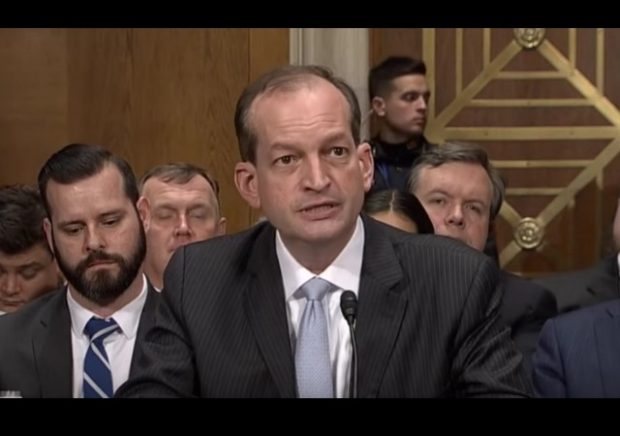

Share
Reverting to a theme of the George W. Bush administration, Alexander Acosta, the new U.S. Labor Secretary, is pushing aiding businesses to go along with workplace protection laws through “compliance assistance” first, and enforcement second.
In his first appearance before lawmakers since taking the DOL post on April 28, Acosta repeatedly said he wants DOL to train businesses in how to follow the law, rather than penalizing them for breaking it. That would “enlist” businesses in compliance, he added.
But under sharp questioning from House Appropriations Labor Subcommittee Democrats, Acosta admitted DOL would still pursue what he called “corporate bad actors.”
“But as a general matter, compliance assistance alongside enforcement is very important,” Acosta told one Republican. That led Rep. Martha Roby, R-Ala., to complain DOL enforcement targeted firms in so-called “right to work” states, like hers.
Acosta, a former National Labor Relations Board member, U.S. attorney for Miami, law school dean and bank president, spent much of his time at the June 7 hearing on his agency’s budget for the coming fiscal year fending off solons’ questions about how “he would do more with less,” as the GOP-run panel’s top Democrat, Rosa DeLauro of Connecticut, put it.
That’s because Trump proposes a cut of up to 21 percent in DOL spending, elimination of several programs, and merger of one DOL agency that rides herd on federal contractors who break labor laws into a separate independent agency that fields civil rights complaints.
“I find it perplexing that you’re advocating job training and yet you cut 40 percent in job training money,” DeLauro told him. One training program, that links community college courses with available jobs, is virtually eliminated, she noted. At its height, it spent $2 billion yearly.
There’s even a cut, of $5 million, one Democrat said, in funding for apprenticeship programs, which Acosta spent much of the hearing touting as a way towards middle-class well-paying jobs. Acosta responded that apprenticeship funding would stay flat, with no cut, at $90 million in fiscal 2018, which starts Oct. 1.
“I wish we had apprenticeship programs in high tech, health care and some other areas,” Rep. Mark Pocan, D-Wis., a Painters union member, told Acosta. That would attract more women to apprenticeships, he said – a point the two agreed upon.
On enforcement, Acosta added, DOL would concentrate on big fish.
“When I was U.S. attorney, I tried to find high-impact cases,” including cases of wage theft, Acosta told Pocan. “I think there’s a value to them, but you also have to keep an eye on the small actors” so they don’t think they can get away with law-breaking.
While the subcommittee Democrats quizzed Acosta on how DOL would survive the huge cut – and how that would particularly hurt programs that aid minorities and women – the panel’s ruling Republicans concentrated on urging Acosta to junk the DOL “fiduciary rule.”
That’s the Obama administration rule, slated to start to take effect June 9, that orders brokers and other investment advisors for individuals and pension funds to put their clients’ interests first, not their own. Trump issued an executive order early in his term telling DOL to revisit the rule, implying he wanted it scrapped, a goal of his business and right wing backers.
Acosta decided the first week of June that there is no reason for more delay, and he stuck to that position during the hearing. “Nobody should be able to snap their fingers and change it,” Acosta said of the fiduciary rule. But in a concession to the GOP, Acosta said the section of Trump’s Office of Management and Budget that reviews federal rules will, in several weeks, call for further comments on the fiduciary rule.

